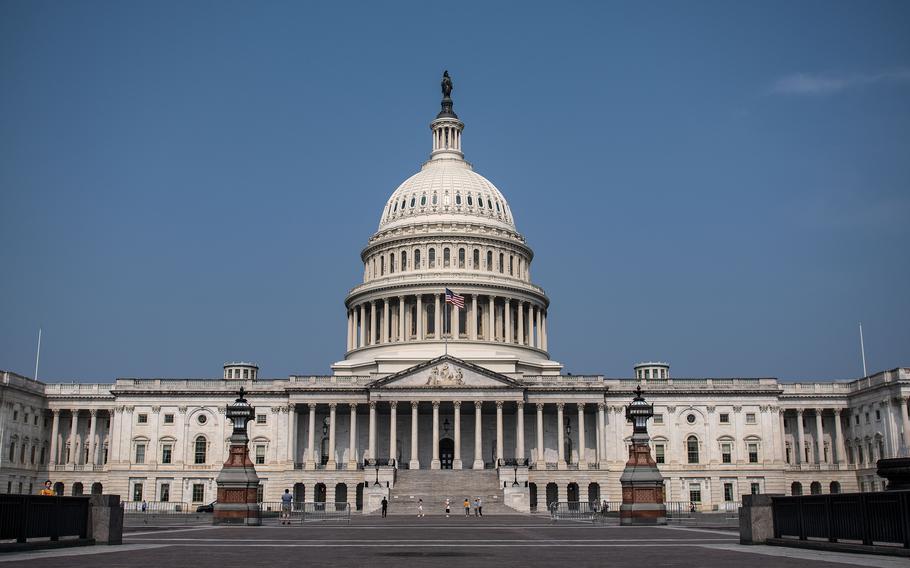
The U.S. Capitol is seen in Washington, D.C., on June 30, 2023. ( Carlos Bongioanni/Stars and Stripes)
The highly contentious partisan fight in Congress over federal spending is creating a strong possibility of a government shutdown on Oct. 1, an all-too-familiar situation that is forcing federal agencies to confront serious budget uncertainties and the prospect of large-scale furloughs.
For most businesses, operating under the constant threat of a shutdown would be unthinkable — none could tolerate the effects of such instability on their workforces and on their ability to serve their customers.
Yet today, these are the exact conditions facing our nation's largest employer, which directly serves millions of people each day and is relied on by the public to meet its basic needs.
While some would welcome a shutdown to solve long-standing policy differences and argue that it would hardly affect the country, keeping our government open and operating is a fundamental responsibility of Congress and the White House. Doing the opposite would seriously harm the American public and the nation's public servants.
A lapse in federal funding, particularly if a shutdown was governmentwide and dragged on for many weeks, would result in the suspension of vital public services, prevent agencies from fulfilling critical missions, deprive federal workers of their livelihoods, damage the economy and further erode public trust in the government. A 2019 Senate report found that the government shutdowns in 2013, 2018 and 2019 cost taxpayers nearly $4 billion.
If the past is prologue, federal employees who ensure the safety of the food and drug supply could be sidelined, small-business loans and new public stock offerings could be put on hold, immigration courts could be closed, scientific research could be halted and air travel could be adversely affected.
A shutdown could also stall some FBI criminal investigations, further drain the federal government's disaster relief fund as it confronts severe climate emergencies and deprive people with disabilities of services. Passport offices, already deluged with applications and facing an enormous backlog, could be closed while the IRS, which is just now getting its head above water, could face a shutdown in tax processing and help lines.
In addition, a drawn-out shutdown would run the risk of diminishing America's standing abroad, making it harder for the country to respond to international threats and undermining its influence in the midst of the war in Ukraine and our dealings with China, Russia and other nations.
While the House and Senate debates over important issues are often contentious and frequently fueled by strong ideological and partisan differences, shutting down the government and denying services to the public should never be an option.
Unfortunately, there have been 21 shutdowns of a day or longer since the mid-1970s, including the 35-day shutdown in the winter of 2018-2019. The last time Congress met its obligation to pass all 12 regular appropriations bills to fund the government by the Oct. 1 deadline came in 1997 during the Clinton administration.
While the current political climate poses a significant challenge to reaching agreement for the fiscal 2024 funding bills, longer-term fixes need to be considered.
For starters, Congress should enact bipartisan legislation offered by Senators James Lankford, an Oklahoma Republican, and Maggie Hassan, a New Hampshire Democrat, which would automatically provide for government funding to continue at existing spending levels when Congress and the president do not meet the deadline to enact new yearlong appropriations bills.
This legislation would also restrict consideration by Congress of other matters — and would prohibit almost all travel for lawmakers, their staff members and White House and Office of Management and Budget officials — until appropriations bills are enacted.
While there are downsides to putting more government spending on temporary autopilot, such a proposal could serve as a stopgap until Congress permanently fixes the badly broken budget and appropriations processes. It should be noted that two-thirds of federal spending, including Social Security, Medicare and Medicaid, is already mandatory and is not hostage to these annual disruptions.
Another way to incentivize lawmakers to act would be to pass legislation requiring that the salaries of members of Congress, the president and vice president be withheld if deadlines are not met to keep the government fully functioning. Why should career federal employees be denied their paychecks, and in many cases still be required to work, while elected officials get paid for reneging on their responsibilities?
The bottom line is that the status quo is unacceptable, a disservice to the American people and the federal workforce, and a dereliction of duty.
It's time for Congress to adopt its own version of the Geneva Conventions for the partisan battlefield. There are some acts of war that should never be contemplated, and there are some activities of Congress, such as government shutdowns, that are unacceptable and should never be tolerated.
This column does not necessarily reflect the opinion of the editorial board or Bloomberg LP and its owners.
Max Stier is the president and chief executive officer of the nonprofit, nonpartisan Partnership for Public Service.